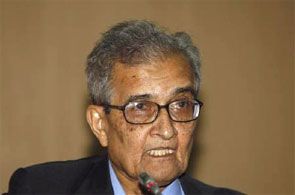 | « Back to article | Print this article |
 Internet is aggravating the digital divide between the literate and the illiterate, Nobel laureate Amartya Sen said in New Delhi on Wednesday.
Internet is aggravating the digital divide between the literate and the illiterate, Nobel laureate Amartya Sen said in New Delhi on Wednesday.
Internet’s contribution is in "making information more easily and more widely available, but on the other hand, it is hardening the divide that already exists between the literate and the illiterate.
"In a country like India, we have a huge number of divisions and digital is adding one more division to that divide,” said Sen.
Sen, along with Nobel laureates David Trimble, a British politician who was the first first-minister of Northern Ireland; Venkatraman Ramakrishnan, Indian-born American and British structural biologist; and Arthur B McDonald, professor emeritus at Queen’s University in Kingston, Ontario, spoke at a session -- Is the Internet both democratic and dangerous.
The event -- Nobel Solutions -- was hosted jointly by NDTV and Tata Consultancy Services.
On net neutrality and Facebook’s ambitious project Free Basics, Trimble said there was a need for access to internet for all.
“I think that it is important that there is access to internet. The primary reason to do this is economic.
The service provider comes later,” said Trimble.
The Telecom Regulatory Authority of India has recommended suspension of the service while it decides what to do next.
The outcome will be critical not just for Facebook, but also for deciding how the internet will work.
Free Basics offers a limited version of the internet on mobile phones that includes access to certain news, health and job portals along with Facebook’s social networking site and messaging services, free of cost.
The programme, launched 10 months ago in India, has triggered a debate.
‘Two-tier pricing could make drugs available to all’
A two-tier pricing system -- one for poor countries and the other for advanced nations - could ensure drugs are available to all, according to Nobel laureate Venkatraman Ramakrishnan.
“The problem is that there are some medicines which deal with some severe public health crisis and they are still in patent (with no cheaper generic available).
"What do you do in such a situation as many people can’t afford that drug?
"Also, the drug companies are not going to make a large amount of money from the third world.
"Therefore, it would be better if we have such a two-tier system.”
Ramakrishnan jointly won the Nobel Prize for Chemistry in 2009 with Thomas A Steitz and Ada E Yonath for their studies of the structure and function of the ribosome, though cautioned the smuggling of lower-priced drugs from poor countries to advanced countries can pose another problem.
He also opposed pharmaceutical companies’ practice of 'evergreening' drugs, where drug makers tweak the drug or formula to extend patent and stop other companies from developing a generic version of the drug.
Image: Amartya Sen. Photograph: Reuters